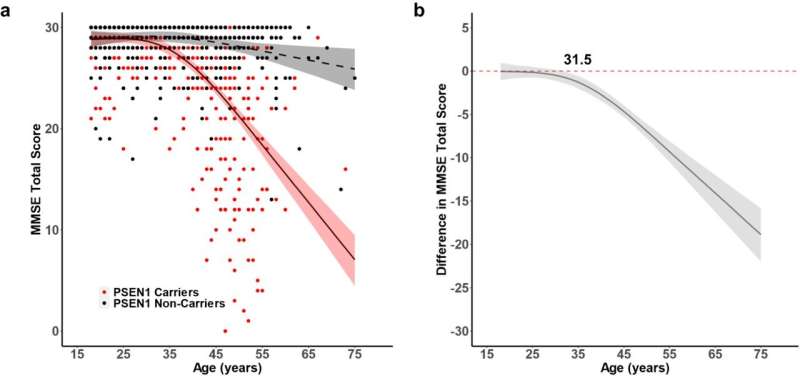This article has been reviewed according to Science X's editorial process and policies. Editors have highlighted the following attributes while ensuring the content's credibility:
fact-checked
peer-reviewed publication
trusted source
proofread
Educational attainment found to protect against a genetic risk factor for Alzheimer's disease

A new study by researchers from Mass General Brigham further illustrates that when it comes to risk of Alzheimer's disease, even genetically determined forms of the disease, genetics is only one piece of the puzzle.
The research is published in the journal Nature Communications.
Researchers investigated the influence of genetics and educational attainment on cognitive decline by studying data from 675 people who carry a mutation that predisposes them to early onset Alzheimer's disease. Carriers of this mutation—known as PSEN1 E280A—have a median age of 49 for onset of dementia. The team found that among carriers who also carried a second mutation that puts them at heightened risk—APOE e4—had an accelerated age of onset of cognitive decline. Among carriers who had an APOE e2 mutation—known to be protective—age of onset was delayed.
The team also assessed the effect of educational attainment on cognitive function among PSEN1 E280A mutation carriers, including those who carried different APOE genotypes. They found that higher educational attainment—that is, more years of education—was associated with preserved cognitive ability, particularly for those at highest genetic risk.
"Higher educational attainment may have a protective effect against cognitive impairment, even in the presence of strong genetic risk factors," said corresponding author Yakeel Quiroz Ph.D., a clinical neuropsychologist and neuroimaging researcher, director of the Familial Dementia Neuroimaging Lab in the Departments of Psychiatry and Neurology at Massachusetts General Hospital. "Despite the additional risk conferred by APOEe4, the strongest genetic risk factor for sporadic Alzheimer's disease, our results suggest that educational attainment may be a critical mechanism of cognitive reserve in familial Alzheimer's disease."
The research team included investigators from Massachusetts General Hospital, Brigham and Women's Hospital, Mass Eye and Ear, and national and international collaborators.
More information: Stephanie Langella et al, Effect of apolipoprotein genotype and educational attainment on cognitive function in autosomal dominant Alzheimer's disease, Nature Communications (2023). DOI: 10.1038/s41467-023-40775-z




















